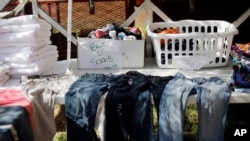Thousands of immigrants from Central America have crossed over the Mexican border into the U.S. state of Texas in recent months, and federal agents have stepped up efforts to process those with no criminal record and allow them to stay with family members in the United States while awaiting their court date. Local communities are providing these weary and hungry immigrants with humanitarian assistance.
This week the Hidalgo County, Texas Sheriff's Department found the decomposing body of a boy in the scrub brush near the Rio Grande River, which delineates the border with Mexico.
Using information scribbled on the boy's belt, deputies contacted a man in Guatemala who identified himself as the boy's father. Sheriff Eddie Guerra said he provided information that helped identify the body.
"A part statement was obtained from the presumed father of the deceased male, who provided the specific clothing description," said Guerra.
The dead boy was 11-years-old, according to his birth certificate, but family members say he was 15.
In recent months there has been a surge of immigrants from Central America arriving in south Texas. Federal authorities have detained minors who are not accompanied by a parent, but have processed and released hundreds of people with children to travel to other U.S. locations where they have family members.
Many of them end up at the bus station in the border town of McAllen, Texas, which is struggling to deal with the large influx.
McAllen spokesman Teclo Garcia said local government, nuns, and local volunteers are providing services in the parking lot of the Sacred Heart Catholic church.
"The county has put up some tents and the sisters are all working to make sure people get fed and they are looked after, and the county health folks are doing some screenings and things of that nature, and then they move along and catch their bus and go wherever," said Garcia.
Garcia said the city has spent about $58,000 on this emergency operation, but he said it could end up spending $500,000 dollars by the end of this year if the situation does not improve.
"While we are handling it now, our preference is that the feds (federal government) take responsibility. We did not cause this situation, we just want to treat people humanely. But we wonder and we are concerned about how long this is sustainable. We do not want to spend $500,000 of taxpayer money on this operation annually," said Garcia.
The operation at the church in McAllen and another one that opened a few days ago farther down the river in Brownsville are managed by Catholic Charities, whose representative, Brenda Riojas, said it started with local citizens.
"They noticed that there were people at the bus station arriving who needed help, so on their own, from the trunks of their cars, they were providing assistance and then when the numbers grew too large, the bus station said this is not the space for this," said Riojas.
Riojas said the church shelter provides immigrants with food, a chance to bathe, a bed to sleep on for a few days and other assistance before they join family members, sometimes in far-off places, like New York or California. She said the volunteers also give them something for the road.
"We provide them also with travel packets. We want to make sure that they have diapers for their children, baby food, water," said Riojas.
Some people have decried such assistance as aiding lawbreakers and encouraging more people to cross the border illegally, but Riojas said the church and other charities in south Texas are only providing humanitarian aid for people already here who are in need of help.
Some members of Congress are also critical of the process of releasing undocumented immigrants and have called for returning them quickly to their country of origin in order to discourage others from coming.




